#And 郎 (rou - super common kanji at the end of boys' names - basically means son or boy)
Text
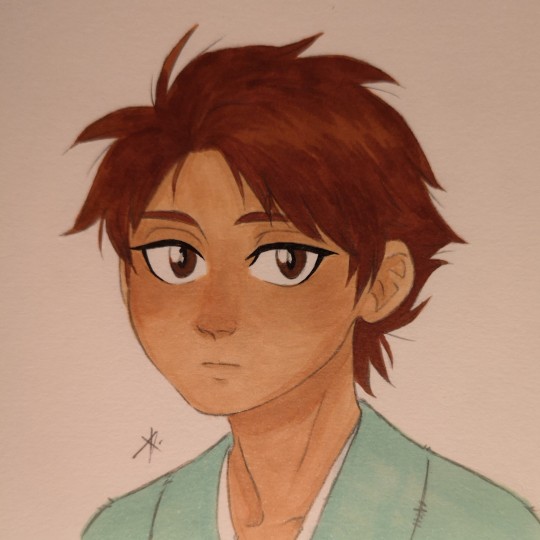
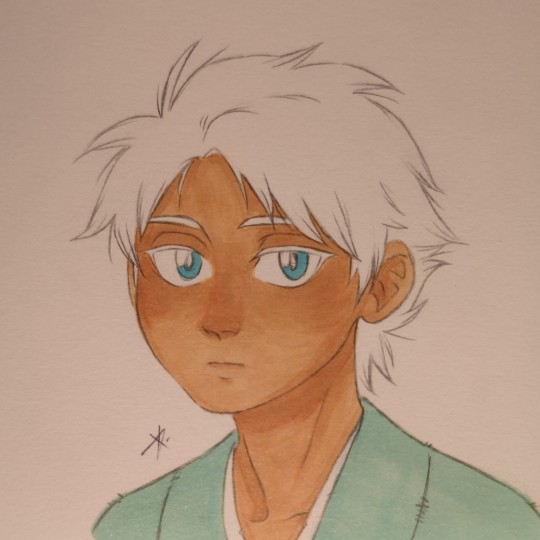
Now what if Tôshirô had brown eyes and brown hair before he died in the human world?
#bleach#toshiro histugaya#hitsugaya toshiro#toushirou hitsugaya#hitsugaya toushirou#Kubo keeps dropping the weirdest lore about him#Did you know he was older than momo? Wtf wtf#And he had a bankai before joining the gotei?#Wtf kubo#Tosh is such a weird little guy#I might draw my headcanon about his past life one day#Happy Birthday Tôshirô!!! ✨🥳🎉❄️🦁#Also fun (?) fact#Tôshirô's name is written with the kanjis 冬 (tou - winter) 獅 (shi - lion)#And 郎 (rou - super common kanji at the end of boys' names - basically means son or boy)#So he has a super cool name that means winter lion#Now when I was stuck studying kanjis#I found an homophone of winter lion (toushi) which is 凍死#It's probably a coincidence but 凍死means death by hypothermia#So there's that
30 notes
·
View notes
Text
Bleach - Name Games
Not a family by name or blood, but a kind of found family. (at least the way they were originally presented) This time I’m tackling the Visored! And while I’m at it I want to address some of the broader thematic elements going on with their original character designs. Buckle up, this is a long one...
Hirako(平子) Shinji(真子)

Shinji’s name is actually kinda of a false start to this one. His names read as “Flat-Child“ and “Real-Child“ but that’s keeping in mind that -ko(子) for “child” is actually just a really common suffix for names, and not one generally used to ascribe literal meaning. (Typically because of its diminutive implications it denotes a female given name, but it applies neutrally to family names, and even generally is not uncommon in male names.) So his name kind reads as “Flat Reality“ or “Flat Truth.“
But this one isn’t actually about the meaning of the words, it’s a different kind of name game. As we all remember, when Hirako introduces himself to Ichigo’s class at Karakura High during his original entrance at the start of the Arrancar Arc, he writes his name on the board mirrored and mentions how he’s “good at doing things backwards.” At the time it was a reference to him being a hollow (Remember that when Ichigo’s inner hollow was given a chapter cover, his “name” was Ichigo’s but written mirrored) and would later influence his zanpakutou, Sakanade(逆撫)
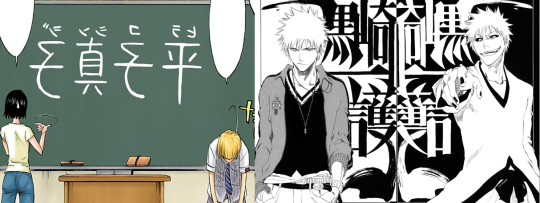
As an aside here, Sakanade(逆撫) has been kind of erroneously translated as “counter stroke” in English, which is technically accurate as a literal translation but is kind of needlessly vague; For one the word “Stroke” here specifically refers to the act of stroking as in petting, patting, or smoothing over, and not something like a sword stroke; secondly the “counter” here should read more obviously as “reverse,” “opposite,” or “inverted.”
Moreover, Sakanade(逆撫で) is an actual verb already, so it doesn’t actually need to be broken down in the first place. The word actually means exactly what it sounds like as well as having a colloquial use as, “rub the wrong way.” Yes, other than just meaning to literally “pet in the opposite direction” (as with petting a cat or dog from tail to head) it means “to irritate” or “to annoy,” (which the former action invariably does) and that is an apt description of Sakanade’s powers.
Anyway... About Hirako’s name not being about the meaning: the joke is that whether you write the name forward or backwards 平子真子 -vs- 子真子平, you still get Shinji(真子) out of it. As in, his name is still legible both forwards and backwards. Plus both kanji, 平 and 真 have horizontal symmetry, so they don’t change when mirrored..
⸻⸻⸻⸻⸻⸻⸻⸻⸻
Okay... let’s do an easier one...
Sarugaki(猿柿) Hiyori(ひよ里)

My personal favorite Visored, has a nice straight forward name Saru(猿) as I’m sure anyone amply familiar with anime knows means “Monkey” and the Gaki(柿) is the word for the fruit “Persimmon.” The image of a monkey in a persimmon tree references an old folktale present in various east-asian cultures about a greedy monkey who cheats other animals before eventually receiving its comeuppance at the hands of the animals it has wronged. In this case it’s reflective of Hiyori’s general image, sandles, track suit, decidedly tomboyish and unladylike; the “mountain monkey” is a poor, rural character type in Japan, not dissimilar to the American hillbilly of the Appalachia.
In that same vein, the name Hiyori(ひよ里) has a peculiar rural slant to it, in that it uses hiragana in place of the first component. The ri(里) is a common place indicator in surnames meaning “village” or “hamlet” but like many Japanese surnames that reference landmarks like -kawa(川)“-river,” “-yama”(山)-mountain,” and “-da”(田)”-field,” the important part isn’t actually the locale but the descriptor preceding it; Which mountain? Which river? Which field? Which village? In the case of Hiyori, it’s not clear... The fact that the village she appears to be named after doesn’t have a kanji again lends to this impression that, like the peasants of Soul Society’s Rukongai, the person who named her didn’t know how to read or write kanji.
⸻⸻⸻⸻⸻⸻⸻⸻⸻
Muguruma(六車) Kensei(拳西)

I think this one has gotten pretty good visibility in the fandom already because of the relation with Hisagi Shuuhei. The eventual explanation of Hisagi’s 69 tattoo would be that it was copied directly from Kensei’s, and that Kensei’s comes from a mix of his name Muguruma, and the fact that he was captain of the Gotei 13’s 9th squad. (Personally I don’t like this explanation, and I think there’s pretty reasonable cause to assume this was a later decision and not a part of Kensei’s original conception or design.) But the reason behind that being Muguruma(六車) Mu(六) which is the Japanese numeral “6″ and Guruma(車) meaning “wagon” and later updated to mean “car.” In the Turn Back the Pendulum sidestory, this name is played upon in how Kubo styled Kensei’s 9th squad as a Bousouzoku(暴走族) the term for a Japanese biker gang (although they often include sports cars), where the “Six Car” reading becomes emblematic of his gang.
There’s a lot about the Bousouzoku that is culturally specific to Japan, but much of the familiar American cliches do actually carry over. One distinct aspect of how the Bousouzoku opperate however, is that they are predominantly a youth culture phenomenon, as any wide spread, organized criminal activity among adults quickly steps on the toes of the much better established Yakuza scene. For this reason it is very rare for Bousouzoku to persist in direct group activity into their adult years, although often bikers become easy recruitment targets for Yakuza.
Kensei(拳西) is actually an odd one for me. It’s both super straight forward yet somehow together really obtuse. Ken(拳) for “Fist” and sei(西) for “West;“ both are pretty singular in their meaning, so it’s not like there’s any uncertainty to what each one means, but I can’t make heads or tails of the two together. For one, Ken(拳) is usually something you’d see put on the end of a compound, and when it’s used that way it tends to denote a kind of martial arts style or technique. It might still be meant to read as “Western Fist” or essentially “Western [style] Fist” and Kubo just liked the sound of Kensei over Seiken. It might be a reference to the fact that Kensei’s original design was largely reminiscent of a kind of military look and feel, with a combat knife for a zanpakutou, short hair, combat boots, and pants that look like they could be part of military fatigues. (the tank top sorta throws the look off, though.) But this was a theme that was dropped by the time the Visored got reincorporated into the story after their long absence.
⸻⸻⸻⸻⸻⸻⸻⸻⸻
Yadoumaru(矢胴丸) Risa(リサ)

...is another odd one. Her surname, Yadoumaru(矢胴丸) has pretty clear implications, Ya(矢) means “arrow” and dou(胴) means “hull” as in the part of a ship, and maru(丸) doesn’t actually have an explicit meaning. The kanji does generally mean “round” or “whole” both in reference to a circle, but it is most notably a suffix used in naming both naval ships, and frequently boys. Given the rest of the name the imagery seems clear, Yadoumaru(矢胴丸) is meant to read as “Arrow-Hull Ship.“* And although the uniform has heavy ties to school girl aesthetics and fetishism (which in turn link to her preoccupation with adult books) the tie here actually seems to be to the origins of the Japanese school girl uniform as a modification of the European naval uniforms introduced to Japan in the 1800s.
*edit: I’m an idiot. A Yadou(胴丸) is the sleeveless chest plate and skirt piece in traditional samurai armor, which also carries over into kendo sports armor.
Adding to this, the name RISA (sometimes romanized as LISA) being written in katakana and not kanji or even hiragana works together with the naval associations would seem to imply she’s of mixed birth? Possibly the daughter of a foreign naval officer stationed in Japan, hence a Western name and a ship as a surname? In fact, most Japanese ships would be named after some mythical figure or indeed named like a person, so the literal descriptor of “Arrow-hull” actually sounds like what someone would call a ship they didn’t know the name of, tacking “-maru” on to the end.
⸻⸻⸻⸻⸻⸻⸻⸻⸻
Let me also take a moment here to complain about the fact that Kubo originally wrote Rabu(ラヴ) and Roozu(ローズ) as katakana, pretty clearly denoting them as the English words LOVE and ROSE and while those seem pretty implicitly like nicknames it also implied in conjunction with their designs that they were both foreigners. So the fact that he retconned them to being nicknames based on more conventionally Japanese when he decided to make them previously SoulSociety shinigami names bugs me... But that being said
Aikawa(愛川) Rabu(羅武)

Man, what is it with Kubo and black people and “love” gimmicks? Zomarri’s Amor, and PePe’s The Love, Love’s whole thing... The name Aikawa(愛川) means “Love River,” and Kubo’s clever shorehorning of kanji into the phonetics for Rabu that he’d already used for the nickname Love use Ra(羅) for “silk,” but specifically a thin or sheer kind, and bu(武) for “warrior”/”soldier.“ The associations with sheer silk and negligee seem very intentional, so his name really is basically “flowing love, [sexy] silk soldier.“ And that’s it, it’s actually super straight forward. I dunno why he looks like an unemployed slacker, in a tracksuit and sneakers, lounging around reading manga, though.
⸻⸻⸻⸻⸻⸻⸻⸻⸻
Otouribashi(鳳橋) Roujuurou(楼十郎)

This might be my favorite as far as name games within the Visored. The given name Roujuurou(楼十郎) means “Watchertower 10 Son;” Rou(郎) being an exceedingly common suffix in boys names meaning “son.” (this is incidentally how anyone with a rudimentary familiarity with Japanese knew for certain Yuushirou(四楓院) was a boy at first glance, where as a bunch of other people thought he was a girl. In case any of you were around certain fandom circles for that whole drama... More on him later though, because he’s got a fun name too.) It’s not super clear if the arrangement here denotes the “Son of the 10th Watchtower [family],” or the “10th Son of the Watchtower [family].”
The surname Otouribashi(鳳橋) is a great little work of poeticism, where Outouri(鳳) is the Japanese name of the Chinese Feng(鳳) which in the most colloquial sense could be translated as “Phoenix,” but there’s a little more to it than that...
See, the Feng is itself the male half of the mated pair of mythical birds together called the Feng-Huang(鳳凰). The Japanese pronunciation Outori is actually directly taken from Ou(王) meaning “King” and Tori(鳥) meaning “bird.” The mythical Feng-huang is in fact king of birds, but more broadly represents a union of yin and yang, and is a common visual element of Chinese weddings evoking harmony. As a part of this theme of unity it is said to share features of many different birds, and also of the 5 fundamentally opposed colors associated with Chinese daoism and fengshui: Red, Blue/Green, Black, White, and Yellow. This particular feature has been tweaked over time to depict the Feng-huang as more broadly multicolored, and associated with the rainbow. (it’s also the basis of the Pokemon Ho-oh, if that wasn’t apparent) For a number of different mythological similarities, the Feng-huang have become erroneously thought of as “the Chinese phoenix,” but I’m not going to get into all that here...
So, getting back to the name, Bashi(橋) means “Bridge.” The, again false equivalence based, but more easily understood translation of Otouribashi(鳳橋) thus being “Phoenix Bridge.” But what is shaped like a bridge and directly associated with the Feng? A rainbow. His family name is just a really fanciful and kind of poetic reference to a rainbow. In conjunction with the “Watchtower” referenced in the name Roujuurou(楼十郎) I’m tempted to take to the meaning of “10th [Floor of the] Watchtower Son” as it implies a high floor, and in the common mythological motif of rainbows as actual physical structures, a high tower would be the sensible entry point to a rainbow bridge.
Also this is why he has a bird mask.
⸻⸻⸻⸻⸻⸻⸻⸻⸻
Kuna(久南) Mashiro(白)

Let me just come right out and say that I haven’t got a damn clue on this one. Mashiro(白) means “White.” Ku(久) means “long time,” na(南) means “South.” She dresses like a super sentai character, specifically one of the original Himitsu Sentei Goranger team, and her mask is a nod to Kamen Rider, with its antenna and big round bug-eyes. I don’t really see a connection with the name and the tokusatsu theme though.
Small aside, Tokusatsu is a genre of Japanese TV and film that was originally named for its emphasis on special effects like camera tricks and editing in post, used most noticeably in children’s shows like Super Sentai and Kamen Rider. That distinction became less and less relevant as special effects became more widespread, and so it is now used mostly to refer to live-action costumed super hero shows.
Super Sentai is btw the source material for the American franchise, Power Rangers, from which Saban Entertainment originally bought the footage that they would cut together with their own original footage, and later from which they would buy the costumes in order to shoot their own shows from scratch.
Also of note is that Ishinomori Shoutarou, author of the original Cyborg 009, was also the original show creator of Kamen Rider and Super Sentai. His work created the transforming(henshin) hero, the body suit and helmet aesthetic, and the heroic billowing scarf, effectively inventing the Japanese superhero almost single-handed.
⸻⸻⸻⸻⸻⸻⸻⸻⸻
Ushouda(有昭田) Hachigen(鉢玄)

Another funky one... “[To] Exist [in] a Shining Field” might be the best way to read Ushouda(有昭田)? Its really the U(有) that gives me trouble here, as it just means “Exist”/”Existance.” And Hachigen(鉢玄) seems to read Hachi(鉢) meaning “bowl” and Gen(玄) meaning “deep,” “mysterious” and in certain contexts “occult.” I’m not sure if that “deep” is really a physical deepness or just a sort of “profoundness” that would fall more in line with “mysterious” and “occult.”
Either way I think the general meaning is actually pretty clear, “bowls of rice from a shining field” evoke an image of kind of mythical field of magical produce, eating from which grants a kind of magical quality and sustenance. In other words, his name is saying that Hachi is such a huge guy and so gifted at magic because he ate a lot of food that grants magic power.
I have no idea why he has the tux or the shaved hair though. Stage magician? Fancy gourmand? But again then why the shaved head and the cross bones? And Kubo did eventually come up with for him is strangely Balinese looking? It seems reminiscent of Barong, king of spirits; A benevolent lion/bear monster that defends mankind from Rangda, the demon queen and master of blackmagic. But apart from the superficial appearance and broad ties to magic, there’s not a lot really tying the two together.
⸻⸻⸻⸻⸻⸻⸻⸻
It’s hard not to just go off on all the weird little design choices, and loose ends, dropped plot points, and retcon’d details that surround the Visored in Bleach. They really were just such a great concept utterly wasted by terrible pacing and some truly confusing priorities as far as publication goes, eithe ron Kubo’s part, editorial, or both... But that’s a story for another time...
#Bleach#hirako shinji#sarugaki hiyori#muguruma kensei#yadomaru risa#aikawa love#otoribashi rose#kuna mashiro#ushoda hachigen#visored
358 notes
·
View notes
Photo
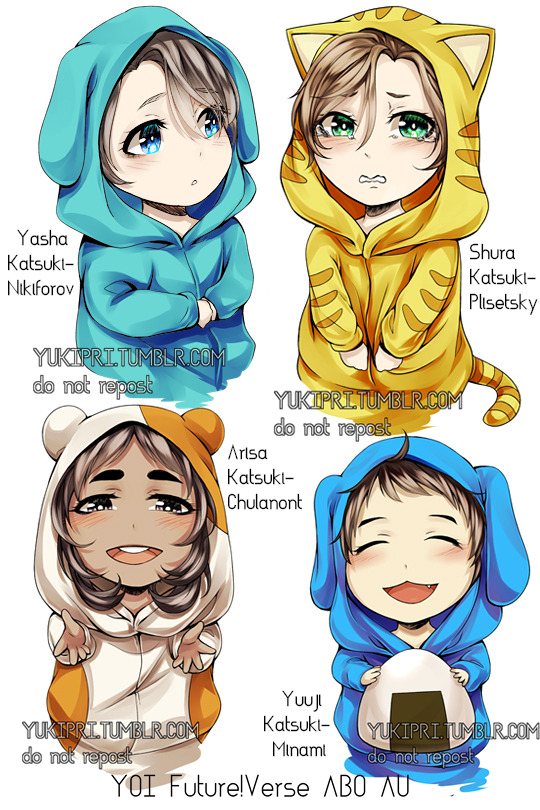
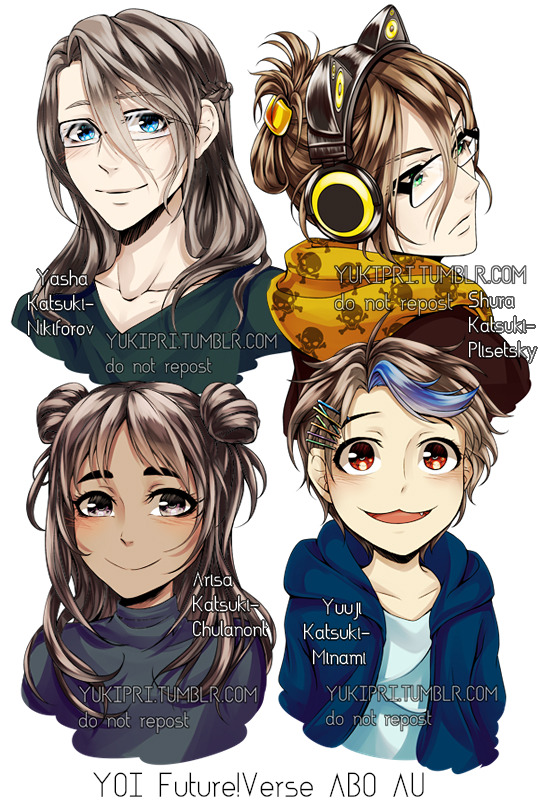
Compilation doodles + Name explanations for the OC kids in the YOI Future!verse ABO AU
^ Literally the above, because I thought WAY too hard about these for legit months (the twins were conceived in my mind back in DECEMBER and Arisa in January >.>;;) and I want to rant about my reasoning for all of them. :P
~~
IF YOU ARE NEW TO THIS AU: It’s Yuuri-centric polyamory in an ABO setting, Yuuri’s married to four mates (Victor, Yurio, Phichit, Minami) and the above are their kids.
BASICS of this AU
INTRO to how ABO works in this AU
OTHER POSTS (comics + illustrations) in the Future!Verse ABO section of my YOI Masterpost.
~~
Please keep ship bashing out of the comments/tags. Don’t like, just skip <3 Thank you.
~~
PLEASE DO NOT REPOST, EDIT, OR OTHERWISE USE MY ART WITHOUT MY EXPLICIT PERMISSION. More detailed rules available on my Rules & FAQ Post.
~~
DISCLAIMER: I don’t know any Russian or Thai and my info comes from not-so-trustworthy Google-sensei though I did my best to triple check from multiple sources including non-English ^ ^; I am however native and fluent in both Japanese and English and also consulted a Japanese linguist regarding my kanji choices ^ ^; If I made any mistakes please be gentle, and also understanding that this is a low-stress self-indulgent near-crack AU >.>;;;
Onwards! vvv
The twins: So one of the base premises of YOI as a series is “HEY check out this name ‘Yuri’ that works in both Russian and Japanese! Let’s have two characters from these nationalities share this name.” So it only makes sense to me that any Russian-Japanese kids they have also follow this multi-lingual pattern. I also really wanted the twins to match as much as possible because their characters are very much inseparable, sides of the same coin type kids.
Turns out finding names that work in both languages other than Yuri is pretty hard, especially when your knowledge of Russian is 0. The ones I came up with I was like AHAHAH NAH WHAT JOKE ANIME VILLAIN NAMES ARE THOSE but in the end I couldn’t find better and after calling them that for months, it’s kinda stuck >.>;
So that’s how I ended up with two names that are both nicknames in Russian, both have pretty unfortunate/evil phonetic first impressions in Japanese, and both are feminine and elegant in their Japanese kanji.
Yasha (夜紗/Яша) - I absolutely wanted this for Victor and Yuuri’s son, because apparently it’s the nickname form of “Yakov” which I mean COME ON. Unfortunately, the English approximation of the Japanese phonetic is “demon,” oopsies, not sure you want to name your kid that in rl, but it sounds cool so you may recognize it from various anime ^ ^;;; Luckily Japanese kanji can switch out meanings, so we have “night” and the second character is an uncommon feminine ending that can mean something like “silk,” but is generally just feminine and pretty.
Shura (珠羅/Шура) - Is apparently a nickname for “Aleksandr” and other variations in Russian. Unfortunately, the most obvious meaning for the sound is “carnage,” most frequently used in shuraba or “scene of carnage” in Japanese (in addition to being taken literally, this can also refer to love trouble situation, such as catching your lover cheating etc). Also sounds cool, also pretty common in anime/song titles but nooooot so great rl name LOL With the swapped out kanji, the first character is “pearl,” and the second, while different from Yasha’s, can also mean “silk” and is also a very feminine and elegant character.
Wow u two like the Free!! kids as boys with girly names
I feel like Yurio would be super excited at the prospect of naming his kids like badass anime characters “Demon” and “Carnage” and Victor would be too tickled by the bilingual options and Yuuri would just sorta cave and be like FINE OKAY but don’t turn to me when the other Japanese kids look at them weird...
ALSO, I’m aware that both are in nickname form and not the full Russian names identified above, but as the nicknames are the only ones that work in Japanese those are their official names ^ ^ Given the international nature of their family, I figure it’s fine.
Arisa (愛利咲/อริสา) - This is a common enough relatively modern name in Japanese, and I found it in enough Thai sources to think it works as a Thai name too, but I’m not entirely sure if it’s a native Thai name or a loan name from a different language and also couldn’t find a Thai meaning to it ^ ^;; But given how I’ve heard Thai nicknaming works, I was like okay it’s fine if it’s leaning towards Japanese right?? Anyway, it’s a name I genuinely love outside of bilingual potential so I was biased towards it the moment I found out it could work ^ ^;
ANYWAY, the meaning of her name based on the characters I chose (many combinations possible for this name) means “blooming love,” which I feel is super fitting for this family. ^ ^ ALSO, the middle “ri” character is not particularly cute or feminine compared to the alternatives, but is rather masculine and the choice is intentional. In Japanese, many parents (including my own), will choose to write their kids’ names using characters from their own or their family members’ names. The “ri” in Arisa is the “ri” in both Yuuri and his sister Mari’s names. This character is also actually the first one in Yuuri’s dad’s name, Toshiya (利也), yep it’s read super differently but it’s there, which absolutely makes it a family legacy thing.
Yuuji (勇次) - The most straightforward of all their names, but also given with some thought. ^ ^;; It’s an obvious combination of Yuuri (勇利) and Kenjirou (健次郎)’s names, and is a pretty normal Japanese name. I also could have gone with “Yuujirou,” but it’s a bit long, the “rou” is really masculine, and it’s also the exact sort of name that would be butchered mercilessly in international contexts (though Yuuji is also a pretty masculine name).
The first character, Yuuri’s “Yuu,” means bravery, and the second character from Minami “ji” is “next,” and is commonly given to the second son. But I feel in this context, “next bravery” also seems like a really good name to give someone who you have high hopes for continuing his parents’ legacy in the next generation.
*All of their hyphenated surnames were chosen based on their parents’ fore-knowledge that they’d be growing up in primarily international contexts. Hyphenated surnames really aren’t a thing in Japan at least and Katsuki-Minami is bizarre af but I figured anything goes if it’s all international and given how unconventional their family already is, they’re going to prioritize keeping the pattern than giving a traditional name. Katsuki is first in all of the kids surnames so the kids’ll be together alphabetically. As of the “current” time in this AU, all of the parents have retained their original surnames.
#YukiPri art#Future!verse ABO AU#OC#polyamory#Alpha/Beta/Omega Dynamics#omegaverse#mpreg#Victuuri#YuriYuu#PhichiYuu#MinaYuu#PHEW how many people knew all of the above before I spelled it out#Did I think too hard on this? Probably. Do I always do this? Absolutely so who cares orz#no one cares shut up me#COUGH ANYWAY yeah the names were not random at all#Also totally random but someone pointed out on Yuuji's post that his hairpins are rainbow#they actually aren't if u look closely they're all the colors of the main adults in their lives
2K notes
·
View notes